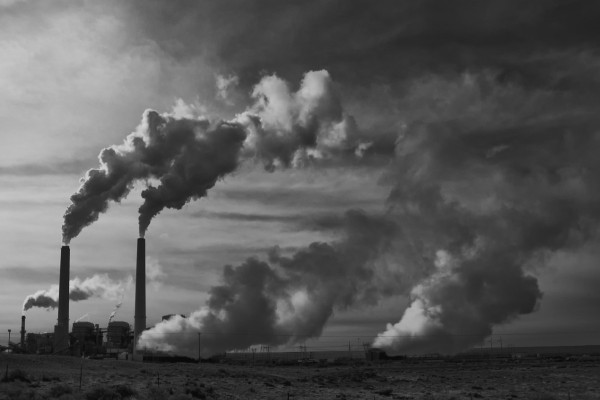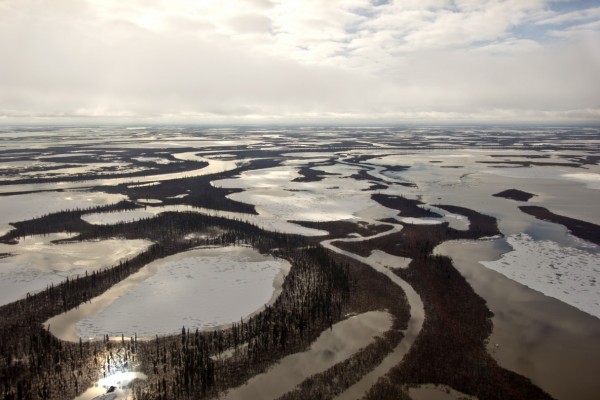By subsidizing the fossil fuel industry, Trudeau is fuelling a national emergency
The value of Ottawa’s subsidies to fossil fuel companies was at least $20 billion in 2022

Oilsands production near Fort McMurray, Alberta. Photo by Kris Krüg/Flickr.
In February 2022, the Trans Mountain Pipeline announced a construction cost update: the new price tag totalled $21.4 billion. The Canadian government, and particularly Finance Minister Chrystia Freeland, insisted that the pipeline was still a worthy investment despite the fact that the price tag had tripled since 2018.
As Eugene Kung writes in National Observer, “These statements were questionable at the time, and one year later, we know why. While the average Canadian is struggling with inflation and increased interest rates, TMX is getting special treatment from Canadian banks and hiding its full financial picture.”
TMX owes the Canadian government almost $16 billion—a debt that increased after Freeland insisted Ottawa would not pump more public money into the project. This federal support, coupled with massive investment from Canadian banks such as BMO and TD, means that even at over $21 billion, the pipeline has retained the backing of the Trudeau government and the largest banks in Canada. This is despite the fact that BMO and TD have revealed that in order to be compensated for their loans to TMX, the pipeline will need to transport oil for the next 100 years—hardly a climate-conscious timeline for a government that has promised to move Canada toward sustainable energy.
Meanwhile, TC Energy is expected to announce cost increases to its Coastal GasLink pipeline, with no criticism from the Canadian authorities backing the pipeline’s construction.
Subsidizing a national emergency
In 2019, the Canadian government under Justin Trudeau declared a climate emergency. One might expect a government that officially recognizes climate change as a national crisis to aggressively disincentivize pollution in the fossil fuel industry, but the exact opposite is true. While Ottawa does not transparently report the value of its subsidies to oil and gas companies, the total was at least $4.8 billion in 2020 (according to the OECD) and may have been as high as $81 billion (according to the IMF).
It is now 2023, and Environmental Defence has found that the value of government subsidies to the fossil fuel industry is, at the very least, $20.2 billion. The organization stresses that this is “likely an underestimate” given “a lack of transparency and public reporting” and the fact that there is “no comprehensive inventory of direct spending by the government.”
These massive fossil fuel subsidies are doing the opposite of what the Trudeau government has promised. They are driving climate change, endangering biodiversity, and damaging local ecologies. This corporate-government alliance of extractivism and environmental degradation inevitably produces local resistance committed to the defence of ecological and communal wellbeing, as evidences by the ongoing organization (and criminalization) of the Secwépemc and Wet’suwet’en peoples in British Columbia.
The United Nations has called multiple times for Trudeau and the BC government to end the surveillance, intimidation, forcible eviction, arbitrary detention, and overall criminalization of land defenders. The RCMP has detained journalists for covering their repressive activities in BC, leading to a lawsuit against them by the online magazine The Narwhal. None of these realities, however, have stopped Trudeau from hosting biodiversity summits, endlessly praising Canada’s climate response, and continuing to subsidize the fossil fuel industry to the tune of billions.
Industry handouts over climate reparations
These handouts to the fossil fuel industry include tax deductions and credits, grants and direct funding, government loans and loan guarantees, reduced royalties and royalty credits, and “externalities,” or the cost of cleanup for pollution, environmental disasters, and damage to equipment.
At COP26, Ottawa promised to end “direct public support” for “the international unabated fossil fuel energy sector by the end of 2022.” However, this promise did not include an end to support for domestic oil and gas projects. It also included some obvious loopholes, such as the use of the rather slippery term “unabated,” which implied exceptions to the declaration and thus deflated its supposed significance.
While continuing to subsidize the fossil fuel industry and criminalize those on the frontlines defending Canadian ecosystems from extractive industry, Ottawa is also shrugging off Global South-originated demands for climate reparations of the type embodied in the Havana Programme of Action and the Cochabamba People’s Agreement.
Canada is one of several industrialized countries which are disproportionately responsible for driving climate change, the effects of which are mainly felt in the Global South. The US, Canada, Russia, the United Kingdom, and the European Union comprise 13 percent of the world’s population, but they make up 56 percent of all global carbon emissions.
Currently, Canada has the second-highest rate of emissions of all G20 countries, behind only Saudi Arabia. Since 1990, Canada has had the highest proportional increase in CO2 emissions relative to G7 countries. Per capita, Canada is the largest or second-largest polluter in the world, accounting for 2.6 percent of all carbon emissions since 1850 despite having 0.48 percent of the world’s population. Meanwhile the US, with 4.25 percent of the global population, is responsible for over 20 percent of emissions since 1850—almost double China, the country in second place.
During COP27, Canada’s environment minister Steven Guilbeault agreed to the idea of “loss and damage” financing for Global South nations impacted by climate change, but he did not offer specific funding numbers. He also laid down conditions for any Southern country hoping to receive loss and damage financing: “It can’t be about liability. Developed nations cannot sign onto something that would make the Canadian public and the European public and the American public liable for lord knows how many hundreds of billions of dollars of damages.”
Shunning global responsibility, criminalizing domestic resistance
So far, the loss and damage financing earmarked by Global North countries has been pathetically small. Over three years, Canada has promised to contribute $5.3 billion annually for an international loss and damage fund, a number that is dwarfed by the government’s yearly subsidies to the fossil fuel industry. This is not a serious attempt at mitigating the climate damages imposed on Global South countries by Northern polluters like Canada.
At the same time that Ottawa is shunning Canada’s global responsibility for the climate crisis, the Trudeau government continues to subsidize the industry that is fanning the flames of a national emergency.
For a country that brands itself as an international climate champion, Canada’s domestic and global actions are rank with hypocrisy and unearned self-congratulation, two things that will not stem the negative impacts of climate change at home or around the world.
Owen Schalk is a writer based in Winnipeg. He is primarily interested in applying theories of imperialism, neocolonialism, and underdevelopment to global capitalism and Canada’s role therein. Visit his website at www.owenschalk.com.










